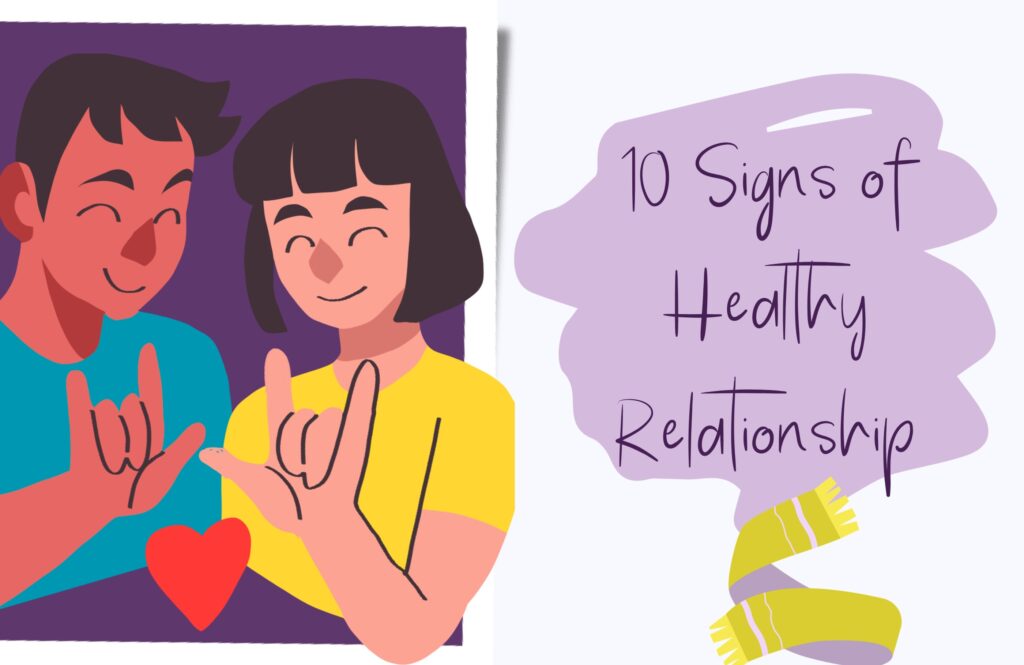Healthy Relationships Are All About Respect
A healthy relationship is like a well-tended garden, requiring attention, care, and nourishment to thrive. It needs to be understood that no relationship can be 100% healthy all the time because relationships aren’t always a bed of roses. A healthy relationship requires hard work, commitment, dedication, and determination to make things work.

A healthy relationship revolves around the following values:
- Compassion, kindness, and empathy
- Reliability, dependability, and commitment
- Mutual respect for boundaries
- The willingness to work as a team
- Mutual values, principles, and relationship goals.
- The ability to work together as a team.
- Similar values and goals.
When a couple share similar values and goals, the relationship reaches a strongpoint forming a bond fueled by likeminded thought. Here are 10 signs of a healthy relationship.
1. Open and Honest Communication
Communication is the lifeblood of any relationship. In healthy partnerships, individuals feel comfortable expressing their thoughts, feelings, and concerns without fear of judgment. It’s not just about talking; it’s about actively listening, understanding, and responding with empathy. Partners share their joys and challenges, creating a safe space for open dialogue. Healthy communication also involves not avoiding difficult conversations that might cause disagreement. Partners connected well to each other find a way of communicating even opposing thoughts to reach a mutual opinion.
2. Mutual Respect
Respect is the foundation of a healthy relationship where partners acknowledge each other’s individuality, value differences, and appreciate unique qualities. In a respectful relationship, decisions are made collaboratively, and neither party feels diminished or dismissed. A healthy couple recognizes that both partners contribute to the relationship’s strength. Respect between a couple means knowing what things mean to each other. It means healthy boundaries exist with the knowledge that crossing them violates each other’s mental and emotional stability. Boundaries also establish a level of respect, proving the importance couples have for each other.
Boundaries give each other space where neither are pressured emotional, intimately, and physically. This facilitates a healthy and loving admiration and respect for each other.
3. Trust and Reliability
Trust is the hallmark of a Healthy relationship, trust relates to parenting, finance, fidelity, and more. When partners trust each other, the relationship becomes predictable, faithful, and reliable. Trust is earned over time through consistent actions and transparent communication. In a healthy relationship, partners trust each other implicitly. They rely on one another and have confidence that their partner will uphold their commitments and promises. Trust creates a solid foundation for a lasting connection, fostering a sense of security and emotional safety.
4. Comfortable Pace and Quality Time
A healthy relationship moves at a comfortable pace convenient for both partners. It is normal for people to want to spend a lot of time with each other in the beginning of a relationship, but as time goes by, individual time is equally important. Both couples need to be on the same page when moving along with the relationship. A happy and healthy relationship is when both people do not feel pressured, rushed, or overwhelmed with demands. A routine sets in with time for each other and “me” time too.
When spending time is concerned, it’s not just about the quantity of time spent but the quality of the interactions. Regularly engaging in activities that bring joy to both partners enhance the overall well-being of the relationship.
5. Constructive Resolution of Conflicts and Compromise
Conflict is inevitable in any relationship, but in a healthy one, partners approach disagreements as opportunities for growth. Resolving conflicts constructively involves open communication, active listening, and a willingness to compromise. Healthy couples understand how fighting is pointless because no one really wins. Instead, debating each other’s points of view through amicable communication and trying to understand each other increases the respect and willingness to participate in healthy dialogue. In a healthy relationship, conflicts are resolved by both parties working together to find practical solutions that benefit and strengthen the relationship.
6. Partners Support Each Other
In a healthy relationship, partners act as each other’s biggest cheerleaders. They provide emotional support, encouragement, and assistance in times of need. Whether celebrating triumphs or navigating challenges, couples in a healthy relationship stand by each other, fostering an environment where both individuals can grow and thrive.
7. Forgiveness
Harboring a grudge or resentment has no place in a healthy relationship. While there is no such thing as a perfect relationship, forgiveness is a sign of love. There are some individuals who despite loving their partners find it difficult to forgive because of psychological and emotional security issues faced in childhood. In this case cognitive behavioral therapy and counselling can help address these issues to identify the triggers that bring out such behavior. Therapy, counselling, and a supportive partner can help provide coping mechanisms that eventually help you adopt a more positive approach to conflicts.
8. Individual Growth and Shared Goals
Healthy relationships are all about shared values, goals and encouraging each other towards personal growth. Rather than stifling individuality, a strong relationship provides a nurturing environment where both individuals can pursue their passions, support each other’s aspirations, and encourage self-discovery. Sharing values and goals builds a foundation for commitment and strong partnership grounded in mutual understanding, and beliefs and unity for relationship growth.
9. Intimacy and Affection
Physical and emotional intimacy are vital components of a thriving relationship. Intimacy both emotional and physical draw partners closer creating a deeper connection that goes beyond the bedroom. Things like cuddling, hugging, holding hands and expressing love through small gestures like texts and touch reinforce the emotional bond between partners. Included in intimacy and affection is kindness and compassion for each other, this makes both partners feel emotionally safe and secure, a vital element in any relationship.
10. Adaptability and Resilience
There is no predictability to life and challenges are inevitable. In relationships too, uncertainties can crop up which us when both partners need to demonstrate resilience, flexibility, and adaptability. Healthy relationships are all about couples facing adversity together and finding ways and means to navigate around them without problems to one another. Weathering the storm together is a learning and growing experience that strengthens the relationship to withstand the test of time.
Strong relationships need love, but love alone isn’t enough to keep a relationship going. A healthy relationship is woven with threads of communication, respect, trust, and shared experiences. Recognizing these ten signs is a guide and roadmap for the future, serving as indicators that the path together is an illuminated one full of hope. A health relationship is not a destination, it is the nature of the journey together that matters, a journey of growth, compromise, commitment, understanding, and love.


